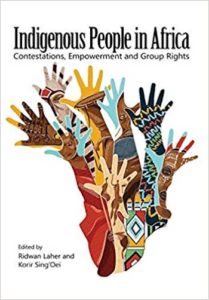
*The indigenous people of Africa are affirmed on this date in c 1000 BCE.
These are African people and their communities on the African continent whose way of life, attachment or claims to land, and social and political standing relative to other more dominant groups have resulted in their substantial marginalization within modern African states (namely, "politically underprivileged group who have been an ethnic entity in the locality before the present ruling nation took over power").
This date chosen is also an international holiday, sometimes called First People's Day. However, most Native Africans can be considered "indigenous" because they originated from that continent and nowhere else; identity as an "indigenous people" is more restrictive in modern applications. Not every African ethnic group claims identification under these terms. Groups and communities who claim this recognition are those who, by various historical and environmental circumstances, have been placed outside of the dominant state systems.
Their traditional practices and land claims often conflict with the objectives and policies publicized by governments, companies, and surrounding dominant societies. Marginalization, along with the desire to recognize and protect their collective and human rights and to maintain the connection of their cultures, has led many to seek identification as indigenous peoples in the modern global sense of the term. After the Berlin Conference and its white-European invasion and colonization, independence took place for several African countries. In the post-colonial period, the concept of specific indigenous peoples within the African continent gained wider acceptance, although not without controversy.
The highly diverse and numerous ethnic groups comprising most modern, independent African states contain various peoples whose situations, cultures, and pastoralist or hunter-gatherer lifestyles are generally marginalized and set apart from the nation's dominant political and economic structures. Since the late 20th century, these peoples have increasingly sought recognition of their rights as distinct indigenous peoples in national and international contexts. The Indigenous Peoples of Africa Co-ordinating Committee (IPACC) was founded in 1997. It is one of the main transnational network organizations recognized as a representative of African indigenous peoples in dialogues with governments and bodies such as the UN.
In 2008, IPACC comprised 150 member organizations in 21 African countries. IPACC identifies several key characteristics associated with Indigenous claims in Africa:
Concerning concerns that identifying some groups and not others as Indigenous is in itself discriminatory, IPACC states that it:
At an African inter-governmental level, the examination of indigenous rights and concerns is pursued by a sub-commission established under the African Commission on Human and Peoples' Rights (ACHPR), sponsored by the African Union (AU) (successor body to the Organization of African Unity (OAU)). In late 2003, the 53 signatory states of the ACHPR adopted the Report of the African Commission's Working Group on Indigenous Populations/Communities and its recommendations. This report says in part (p. 62):
The adoption of this report at least notionally subscribed the signatories to the concepts and aims of furthering the identity and rights of African indigenous peoples. However, the extent to which individual states are mobilizing to implement these recommendations varies enormously. Most indigenous groups continue to agitate for improvements in land rights, use of natural resources, protection of environment and culture, political recognition, and freedom from discrimination. On December 30, 2010, the Republic of Congo adopted a law for the promotion and protection of the rights of African indigenous peoples. This law is the first of its kind in Africa, and its adoption was a historic development for indigenous peoples.